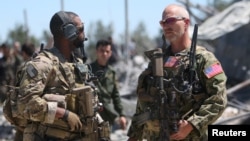The White House said Wednesday that 2,000 U.S. troops in Syria had begun withdrawing, shortly after President Donald Trump tweeted that the U.S. had defeated Islamic State in the Middle Eastern country. The announced withdrawal marked a sudden reversal in U.S. military strategy in the region, where senior U.S. military and other officials have been pushing for a longer-term military presence to help ensure IS does not re-emerge.
Here are answers to frequently asked questions about the development
How long have U.S. troops been in Syria?
U.S. ground troops have been in Syria since 2015. An American-led military aerial campaign against IS began in 2014.
Where are the U.S. troops located?
U.S. troops are primarily in north-central and northeast Syria, with a smaller presence along Syria's southern border with Jordan.
What do U.S. troops do in Syria?
U.S. troops advise and collaborate with an alliance of Kurdish and Arab militias known as the Syrian Democratic Forces.
Who are the Kurds the U.S. troops are based near?
The Kurds are the largest ethnic minority in Syria, with fewer than 2 million living in northeastern Syria, according to The Kurdish Project. The U.S. forces have been deployed with the YPG Kurdish militia, which is based in the region. Syrian Kurds intend to establish an autonomous region in northeast Syria, as Kurds did in neighboring Iraq.
What is the situation in northeastern Syria?
North-central and northeast Syria is now largely controlled by Syrian Kurdish allied forces. The future of the region will be determined by two Kurdish political parties, the Kurdish National Council (KNC) and the Democratic Union Party (PYD). The parties disagree on how to defeat IS and how to best govern the area.
Why is Turkey concerned about the U.S. military's collaboration with the Kurds?
Turkey views any powerful Kurdish militia as a possible threat and more motivation for Kurdish separatists in Turkey. Turkey threatened earlier this month to deploy forces to Syria to repel Kurdish and Arab militias. Turkey is concerned that this region of Syria could become an independent or quasi-independent region linked to the Kurdish separatist group PKK, which Turkey and the United States classify as a terrorist organization. Turkey has been engaged in a war with the PKK for three decades.






